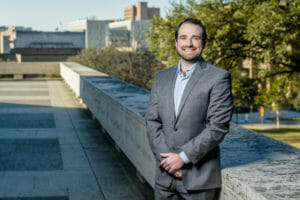By: Tyler Bowen (Ph.D., Yale University, 2021)
My time as an America in the World Consortium (AWC) postdoctoral fellow has helped me advance my work and develop my skills as a scholar. The most recent example of this was the practice “job talk” that I gave in the “Works in Progress” workshop. My job talk is based off my dissertation, The Logic of Escalation and the Benefits of Conventional Power Preponderance in the Nuclear Age. In my talk, I argue that states with more conventional options for escalation have more bargaining power in nuclear disputes, especially in disputes over peripheral interests. This incentivizes states to develop a large, diversified, rapidly deployable, and forward-deployed conventional force.
The academic job talk for American universities is a unique beast, combining a display of research acumen along with more classic public speaking skills.
These talks can often make or break your chances of getting a tenure-track position at a university. This is why it is important to prepare for these talks well in advance and make sure that they are polished products once you do get an interview.
This is why I decided to use the Works in Progress workshop as a forum for practicing my job talk. I expected that my fellow postdocs and predocs would be well-positioned to critique both my research and the talk itself, giving me pointers on how to improve it. My colleagues more than delivered on those fronts. I had given my talk once before and received feedback on improving it. I tried out new material in this version of the talk and comparing how that went compared to my first run gives me a much better idea of what should work in the real job talk. Plus, my colleagues gave me tips that I had not received before or thought about. For example, Zoltan Feher, an AWC predoctoral fellow at the University of Texas, recommended that I write down the talk and practice it from there. I have done this, and am finding in my own practices that this has quickened the pace of the talk and cleaned up the transition between slides, both of which were issues with my practice talk.
In addition, I received comments that will help me improve the project as a whole. John Gleb, an AWC predoctoral fellow with me at SAIS, said that I should find and present evidence that policymakers are investing more in conventional capabilities because they see the value of having more conventional options for escalation. Officials within the Kennedy administration, which I focus on in my case study of the Cuban Missile Crisis, made this case. A broader study of the Kennedy administration could therefore bolster the strength of the argument.
Overall, I feel a lot of gratitude for my colleagues who took time out of their schedules to give me feedback. It is a tangible way in which the AWC fellowship has helped me advance my research agenda.
—
Tyler Bowen is an America in the World Consortium Post-Doctoral Fellow focusing on how nuclear weapons affect U.S. foreign policy. His dissertation, entitled The Logic of Escalation and the Benefits of Conventional Superiority in the Nuclear Age, explains how nuclear weapons shape the benefits of conventional military superiority for the United States and other great powers.
Tyler also uses the framework from his dissertation to say forward-deployed forces can provide a security benefit to the United States, and that in East Asia, this benefit is worth the costs needed to sustain those forces.
He received his Ph.D. in political science from Yale University in 2021, and he most recently worked as a Stanton Nuclear Security Pre-Doctoral Fellow at MIT in 2020-21. His other research projects examine questions of public opinion around nuclear use, the nature of nuclear superiority, the sources of deterrence failure, and the utility of military strikes against nascent nuclear programs.

